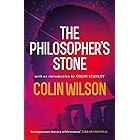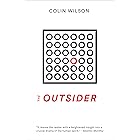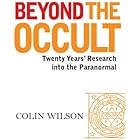| Digital List Price: | $6.99 |
| Kindle Price: | $6.49 Save $0.50 (7%) |
| Sold by: | Amazon.com Services LLC |
Your Memberships & Subscriptions

Download the free Kindle app and start reading Kindle books instantly on your smartphone, tablet, or computer - no Kindle device required.
Read instantly on your browser with Kindle for Web.
Using your mobile phone camera - scan the code below and download the Kindle app.

OK
 Audible sample Sample
Audible sample Sample 


The Mind Parasites Kindle Edition
- LanguageEnglish
- PublisherMonkfish Book Publishing
- Publication dateMay 15, 2013
- File size1161 KB
Customers who bought this item also bought
Editorial Reviews
About the Author
British author of THE OUTSIDER and many other books British author of A SECRET HISTORY OF CONSCIOUSNESS and IN SEARCH OF PD OUSPENSKY
Product details
- ASIN : B00C4GTJ3C
- Publisher : Monkfish Book Publishing (May 15, 2013)
- Publication date : May 15, 2013
- Language : English
- File size : 1161 KB
- Text-to-Speech : Enabled
- Screen Reader : Supported
- Enhanced typesetting : Enabled
- X-Ray : Enabled
- Word Wise : Enabled
- Sticky notes : On Kindle Scribe
- Print length : 241 pages
- Best Sellers Rank: #667,020 in Kindle Store (See Top 100 in Kindle Store)
- #753 in Metaphysical Science Fiction eBooks
- #3,058 in Occult Horror
- #3,284 in Alien Invasion Science Fiction
- Customer Reviews:
About the author

Colin Henry Wilson (26 June 1931 – 5 December 2013) was an English writer, philosopher and novelist. He also wrote widely on true crime, mysticism and the paranormal. Wilson called his philosophy "new existentialism" or "phenomenological existentialism", and maintained his life work was "that of a philosopher, and (his) purpose to create a new and optimistic existentialism".
Bio from Wikipedia, the free encyclopedia. Photo by Tom Ordelman Thor NL (Own work) [GFDL (http://www.gnu.org/copyleft/fdl.html), CC-BY-SA-3.0 (http://creativecommons.org/licenses/by-sa/3.0/) or CC BY-SA 2.5-2.0-1.0 (http://creativecommons.org/licenses/by-sa/2.5-2.0-1.0)], via Wikimedia Commons.
Customer reviews
Customer Reviews, including Product Star Ratings help customers to learn more about the product and decide whether it is the right product for them.
To calculate the overall star rating and percentage breakdown by star, we don’t use a simple average. Instead, our system considers things like how recent a review is and if the reviewer bought the item on Amazon. It also analyzed reviews to verify trustworthiness.
Learn more how customers reviews work on AmazonReviews with images
-
Top reviews
Top reviews from the United States
There was a problem filtering reviews right now. Please try again later.
Sounds a bit crazy until the scientist made the connection between cancer and not fulfilling your destiny and then it go real. This is what caught my attention and has had me thinking hard ever since. Here’s Wilson’s theory, we are all vibration—if you have a thought that you push away—say you always wanted to be a ..... that thought doesn’t go away, it just doesn’t get any more energy, and therefore sits like an irritant in a person. Multiply this idea across millions of minds, and you have a powerful thought form wanting attention—a thought form that was never given the energy to be realized so it sits at a lower vibratory level wanted to eat. Viola` you have a parasite that sucks on your lower energies.
Piaget, a famous psychologist igist said that the worse thing for children was their parents unrealized dreams. They project these dreams onto their unsuspecting progeny, driving them into doing what they might not want to do, but must because they love their parents.
My conclusion from what Wilson was trying to say, is that we can’t blame anyone else for our misery—it’s our own unrealized potential remaining a needy child trying to get our attention.












